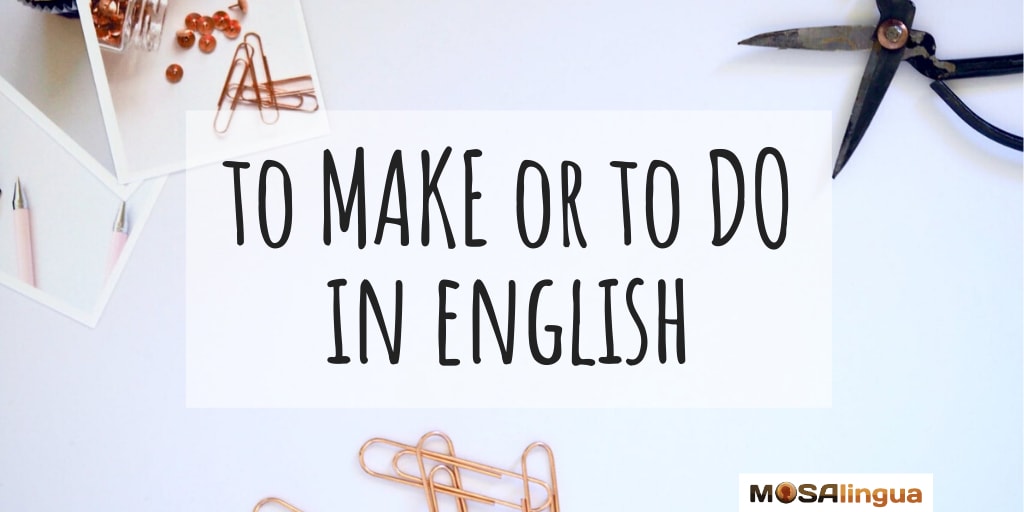Let’s talk about verbs: make or do in English. These are two verbs that are very useful but also, in a way, they can be quite tricky to use. Today, we’re going to explain how to choose which of these English verbs to use, and we’ll give you some tips to help you understand the difference.

If you’d prefer to listen to this article, be sure to check out our MosaLingua Language Lab podcast:
Listen to “#56 – To Make or To Do?” on Spreaker.
Creating in English: Why’s It Different from Other Languages?
Think of the verb “to appoint” in the sense of “designate.” For example: “the President can appoint members of the government.” The noun form of this verb is “an appointment.” But “an appointment” can also translate as an “appointment,” like a meeting that you can schedule with a doctor or a banker. However, in that case, the verb “to appoint” is not the right verb. You need a kind of “spare verb” to express the action of calling the doctor or the bank to ask for an appointment. Here, in English, we’d say: “make an appointment.”
To make and to do are two verbs that express “creation” in English, creating something or doing an action. Some languages have a specific verb that allows you to talk about actions that do not have their own verb. It’s “hacer” in Spanish, “fare” in Italian, “faire” in French, “fazer” in Portuguese, etc. It’s a single verb that covers all other situations. And in English, what makes the situation very confusing is that there isn’t just one verb… but two. The two most common verbs used to translate this idea are: to make and to do. That’s why it can be difficult for English learners to decide which one to use in a given situation.
How to Know When to Use Which Verb: Make or Do in English?
So, is it make or do in English? Fortunately, we have a very simple trick that works most of the time. Just ask yourself the question: does the action create something new?
- If the answer is yes, then you will probably need to use the verb to make
- If the answer is no, you will probably need to use the verb to do.
Some examples to help you understand whether to use make or do in English:
Food
- Do we say to make or to do a cup of tea?
Remember, just ask yourself: are you creating something new? Here, you take hot water and tea leaves, and you combine them to make a new, hot drink. So yes, you are creating something completely new: a concrete “object” that did not exist before. So we say, “to make tea, coffee, smoothies” and other foods or drinks.
MosaTip: in the UK, you might hear someone say, “Make us a brew!” They’re asking you to make them a cup of tea!
Beauty
- Next, do we say: to make or to do our hair?
Are you creating something new? No, usually, we do not add new hair to our head. We simply rearrange our hair for a different look. So this time, we say to do our hair, the same as when we do our nails and do our makeup.
MosaTip: That’s why a hairstyle is sometimes called a hairdo!
Household chores
- Do we say to make or to do the dishes?
Again, are you creating something new? No, you’re removing the dirt from the dishes that already exist. So we’ll say “I do” when we talk about things like the dishes, the laundry, the housework, and the cleaning.
Sounds
- Last one: do we say to make or to do noise?
Are you creating something new? Sure, you’re adding sound to silence by using your mouth, a guitar, or pots and pans. So here, we say to make noise and to make music.
MosaTip: That’s why at music festivals and live performances, you’ll often hear singers tell the audience to “Make some noise!”
Is it getting a bit clearer now? As with any hack, it doesn’t work perfectly 100% of the time. But it’s a great starting point. The more you read and use the verbs make or do in English, the better you will be able to remember them and choose which to use.
Another option: find a more specific verb!
Another tip is that if you have doubts about the verb to use and can’t decide, use neither! Find a more precise verb to say the same thing or evoke the same action.
For example, if you’re hesitating between make your homework or do your homework, you can always say “I’m going to work on my homework.” Stuck between make a cake and do a cake? Why not say “I’m going to bake a cake”? Is it make a decision or do a decision? Just say “I’m going to decide.” Paint your nails rather than doing them, and earn money rather than make it.
And don’t forget, the verb to finish is another verb that you can use in a lot of situations to replace make or do in English. For example: “I need to finish this video.” Speaking of which…
Make or Do in English: Abbe’s Video Summary
These tips come from a video on English grammar recorded by Abbe, our English teacher. You can watch her video on our YouTube page or below. This video was recorded in English (to help you with your learning!). But don’t worry, you can turn on subtitles (in 6 different languages). And you can reduce the playback speed if necessary by clicking on the gear in the bottom right corner of the video. Enjoy!
Don’t forget to subscribe to our YouTube channel so you don’t miss a trick!
Are you learning English grammar? Don’t miss our articles on the best way to learn English grammar, and reasons English grammar is easy to learn.
Happy learning!




Comments